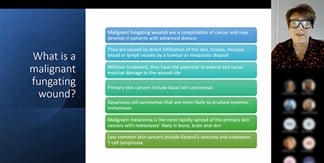The initial inflammatory phase becomes chronic and blocking the emergence of a healthy and productive granulation tissue. The microenvironment of the wound changes. Excessive proteases destroy growth factors such as VEGF or HFG involved in tissue angiogenesis and epithelial proliferation and migration. Detailed analysis reveals that the phenotype of macrophages at the early- and late-stages of the inflammatory response are important regulators of granulation tissue formation and interleukin-4 alpha receptor-mediated profibrotic scaring. A clear understanding will help clinicians to effectively treat patients with chronic wounds particularly at the stage of wound bed preparation. Moreover, clinicians will get better insights into fibrotic scaring, a condition causing significant impairment and discomfort for patients.
